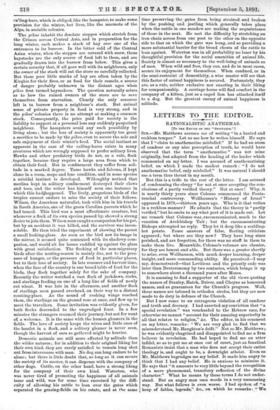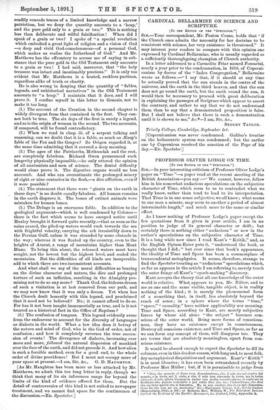LETTERS TO THE EDITOR.
RATIONALISTIC ANATHEMAS.
[TO TEE EDIrOlt OF THE " SPFCTATOR."1
Siu,—Mr. Matthews accuses me of writing "in a heated and reckless temper." Let us see how he writes himself. He says• that I " claim to anathematise misbelief." If be had an atom of candour or any nice perception of truth, he would have observed that the term " anathematise " was not mine originally, but adopted from the heading of the leader which commented on my letter. I was accused of anathematising belief, on which I made the modest remark : " I do not anathematise belief, only misbelief." It was natural I should use a term thus thrust in my mouth.
But this is a trifle to the rest of the letter. I am accused of condemning the clergy " for not at once accepting the con- clusions of a partly verified theory." Not at once ! Why, it is nearly thirty years since Colenso commenced the Penta- teuchal controversy. Wellhausen's "History of Israel' appeared in 1878,—thirteen years ago. Who is it that writes- in a reckless manner? He admits that the theory is "partly verified," but he omits to say what part of it is made out. Let. me remark that Coleus:, was, excommunicated, much to the vexation of Archbishop Tait ; but the excommunicating Bishops attempted no reply. They let it drop like a scalding- hot potato. Some answers of false, fleeting criticism appeared ; but where are they now ? They have long since perished, and are forgotten, for there was no stuff in them to make them live. Meanwhile, Colenso's volumes are classics,. for they are honest and able. But there was a greater shortly to arise, even Wellhansen, with much deeper learning, deeper insight, and more commanding ability. He perceived—I may say, demonstrated—that Leviticus and the priestly code was later than Deuteronomy by two centuries, which brings it up- to somewhere about a thousand years after Moses.
It is amusing to find a supporter of the old views quoting the names of Stanley, Hatch, Driver, and Cheyne as honoured names, and as guarantees for the Church's progress. Well, these names are tabooed in orthodox circles, but they are now- made to do duty in defence of the Church.
But I now come to an outrageous violation of all candour and truth and decency. I had asserted my conviction that" special revelation was vouchsafed to the Hebrew race, for- otherwise we cannot " account for their amazing superiority in all that relates to religion," &c. The editor, in his comment on my letter, remarks : " We are very glad to find that we misunderstood Mr. Haughton's drift." Not so Mr. Matthews ; he was evidently chagrined and disappointed to find me a firm believer in revelation. He had hoped to find me an utter• infidel, so as to put me at once out of court, just as fanatical Romanists insist that a man who does not accept their entire theology is, and ought to be, a downright atheist. Even so Mr. Matthews begrudges me my belief. It made him angry to think that I had any belief. He is anxious to minimise it. He says that "it amounts to very little beyond the recognition, of a mere phenomenal, transitory reflection of the divine character." What he means by these terms I do not under- stand. But an angry man uses words in a very unmeaning way. But what follows is even worse. I had spoken of " a heap of fables, legends," &c., on which he remarks : " We readily concede traces of a limited knowledge and a narrow patriotism, but we deny- the quantity amounts to a ' heap,' and the pure gold only to a grain or two." This is nothing less than deliberate and wilful falsification ! When did I speak of a grain or two P I spoke of " a special revelation which embodied a great light of religion and a vision of God —a deep and vivid God-consciousness—of a personal God, which makes us realise the fatherhood of God." And Mr. Matthews has the effrontery to accuse me of saying in sub- stance that the pure gold in the Old Testament only amounts to a grain or two ! I had said, moreover, that " the holy treasure was intact and inestimably precious." It is only too evident that Mr. Matthews is a heated, reckless partisan, regardless alike of truth or charity.
He is also wrong in denying that the quantity of " fables, legends, and unhistorical narratives" in the Old Testament amounts to "a heap." I maintain. that it does, and I will prove it. I confine myself in this letter to Genesis, not to make it too long.
(L) The account of the Creation in the second chapter is widely divergent from that contained in the first. They can- not both be true. The six days of the first is surely a legend, and so is the origin of woman in the second. The two accounts, if compared, will be found contradictory.
(2:) When we read in chap. iii. of a serpent talking and reasoning, can we doubt that it is a fable, as much as .,Esop's fable of the Fox and the Grapes ? So Origen regarded it, at the same time admitting that it covered a deep meaning.
(3.) The ages of the Patriarchs, Methuselah and the rest, -are completely fabulous. Richard Owen pronounced such longevity physically impossible,—he only uttered the opinion of all anatomists and men of science. The dental difficulty -would alone prove it. The digestive organs would no less succumb. And who can overestimate the prolonged misery of eight or nine centuries in the flesh,—a dire affliction, even if it were possible ?
(4.) The statement that there were "giants on the earth in those days," is no doubt equally fabulous. All human remains in the earth disprove it. The bones of extinct animals were mistaken for human bones.
(5.) The Deluge is an enormous fable. In addition to the geological argument—which is well condensed by Colenso- there is the fact which seems to have escaped notice until Huxley brought it forward quite recently,—that as soon as the rains ceased, the piled-up waters would rash towards the sea with frightful velocity, carrying the ark irresistibly down to the Persian Gulf, unless it was stranded by some obstacle in the way; whereas it was floated up the country, even to the heights of Ararat, a range of mountains higher than Mont Blanc. To bring this about, the released waters must have sought, not the lowest but the highest level, and scaled the mountains. But the difficulties of all kinds are insuperable, add to which there are two inconsistent accounts.
And what shall we say of the moral difficulties as bearing on the divine character and nature, the dire and prolonged torture of such an infliction, resulting in the Almighty pro- mising not to do so any more ? Thank God, the hideous dream of such a visitation is at last removed from our path, and we may now know that it was only a dream. Yet when has the Church dealt honestly with this legend, and proclaimed that it need not be believed ? No; it cannot afford to do so. For has it not been taught immemorially as true, and is it not treated as a historical fact in the Office of Baptism ?
(6.) The confusion of tongues. This legend evidently arose from the endeavour to account for the diversity of languages or dialects in the world. What a low idea does it betray of the nature and mind of God, who is the God of order, not of confusion ; and how it completely reverses the true succes- sion of events ! The divergence of dialects, increasing ever
more and more, followed the natural dispersion of mankind -over the face of the earth, and did not precede it. And how alien is such a forcible method, even for a good end, to the whole .order of divine providence ! But I must not occupy more of your space at present.—I am, Sir, &c., G. D. HAUGHTON.
[As Mr. Houghton has been more or less attacked by Mr.
Matthews, we admit this too long letter in reply, though we 'think that many of its six inferences range far beyond the Emits of the kind of evidence offered for them. But the -detail of controversies of this kind is not suited to newspaper . the discussion.—En. Spectator.]
treatment, and we cannot find space for the continuance of (Regensburt 1832), p. 367; or Roberts, Rev. William W., The Pontifical Decrees



































 Previous page
Previous page